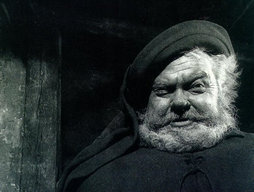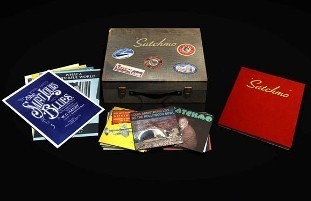Terry Teachout's Blog, page 221
July 22, 2011
TT: The snare of perfectionism
* * *
 Twenty-six years after his death, Orson Welles is back in the news. "Chimes at Midnight," the 1965 film version of Shakespeare's history plays that occupied him throughout his middle age, will be shown in England next month in what is being billed as a "brand-new, never-seen-before restoration." The reason why it had to be restored is that "Chimes at Midnight" was made independently and on the cheap, for by 1965 Welles had so antagonized the Hollywood establishment that no major studio would have anything to do with him. As a result, "Chimes at Midnight" was shot, edited and dubbed under sub-standard conditions, and the prints that have circulated since the film's original release are all of low quality.
Twenty-six years after his death, Orson Welles is back in the news. "Chimes at Midnight," the 1965 film version of Shakespeare's history plays that occupied him throughout his middle age, will be shown in England next month in what is being billed as a "brand-new, never-seen-before restoration." The reason why it had to be restored is that "Chimes at Midnight" was made independently and on the cheap, for by 1965 Welles had so antagonized the Hollywood establishment that no major studio would have anything to do with him. As a result, "Chimes at Midnight" was shot, edited and dubbed under sub-standard conditions, and the prints that have circulated since the film's original release are all of low quality.Welles' long-standing difficulties with Hollywood are the stuff of legend. At bottom, though, they amount to this: He was a fanatical, impractical perfectionist who was willing to spend any amount of time and money on his films. But it was always other people's money, and the moguls who put up the money in Hollywood did so in order to make still more money. After Welles made "Citizen Kane" in 1941, it was clear that he was neither interested in making box-office smashes nor willing to tolerate the relentless assembly-line discipline of the American film industry. Hence he spent most of the rest of his life wandering in the wilderness of underfunded independent film production, unable to fully realize any of his creative dreams.
Is it fair to say that Welles' perfectionism laid him low? Every great artist, after all, strives for perfection. In fact, that's part of what makes them great: They're never entirely satisfied with anything that they do....
Alas, that kind of suffering goes with the territory. The trick, as every artist knows, is not to let it interfere with getting things done. The wisest artists are the ones who finish a new work, walk away and move on to the next project. Whenever a colleague pointed out a "mistake" in one of Dmitri Shostakovich's compositions, he invariably responded, "Oh, I'll fix that in my next piece."
The road to malignant perfectionism, by contrast, starts with chronic indecision. Jerome Robbins, whose inability to make up his mind was legendary throughout the world of dance, was known for choreographing multiple versions of a variation, then waiting until the last possible minute to decide which one to use. Beyond a certain point, this kind of perfectionism is all but impossible to distinguish from unprofessionalism, and Orson Welles reached that point early in his career....
* * *
Read the whole thing here .
Orson Welles talks about Chimes at Midnight and the character of Falstaff in a BBC interview:
TT: Almanac
Herman Melville, "Hawthorne and the Mosses"
July 21, 2011
TT: So you want to see a show?
Here's my list of recommended Broadway, off-Broadway, and out-of-town shows, updated weekly. In all cases, I gave these shows favorable reviews (if sometimes qualifiedly so) in The Wall Street Journal when they opened. For more information, click on the title.
BROADWAY:
• Anything Goes (musical, G/PG-13, mildly adult subject matter that will be unintelligible to children, closes Jan. 8, all performances sold out last week, reviewed here)
• How to Succeed in Business Without Really Trying (musical, G/PG-13, perfectly fine for children whose parents aren't actively prudish, all performances sold out last week, reviewed here)
• Master Class (drama, G/PG-13, not suitable for children, extended through Sept. 4, most performances sold out last week, reviewed here)
OFF BROADWAY:
• As You Like It (Shakespeare, G/PG-13, closes Aug. 14, reviewed here)
• Avenue Q (musical, R, adult subject matter and one show-stopping scene of puppet-on-puppet sex, reviewed here)
• The Fantasticks (musical, G, suitable for children capable of enjoying a love story, reviewed here)
IN WASHINGTON, D.C.:
• Oklahoma! (musical, G, remounting of 2010 production, suitable for children, closes Oct. 2, original run reviewed here)
CLOSING NEXT WEEK IN CAPE MAY, N.J.:
• The Understudy (comedy, PG-13, closes July 30, reviewed here)
CLOSING SATURDAY IN CAPE MAY, N.J.:
• He and She (drama, G, not suitable for small children, reviewed here)
CLOSING SUNDAY OFF BROADWAY:
• Play Dead (theatrical spook show, PG-13, utterly unsuitable for easily frightened children or adults, reviewed here)
TT: Almanac
Benjamin Britten, "Variations on a Critical Theme"
July 20, 2011
TT: Snapshot
(This is the latest in a weekly series of arts-related videos that appear in this space each Wednesday.)
TT: Almanac
Benjamin Britten (interview, CBC, Nov. 21, 1961)
July 19, 2011
TT: Almanac
Benjamin Britten, On Receiving the First Aspen Award
July 18, 2011
TT: Pops in a box
 Does Satchmo get the job done? I haven't seen it yet, and nobody at Universal asked for my advice, but I have seen a complete track listing, and I can tell you that of the thirty "key recordings by Louis Armstrong" listed in the appendix to
Pops: A Life of Louis Armstrong
, twenty-seven will be included on Satchmo. That's a damned good batting average--which figures, since Armstrong
scholar
-
blogger
Ricky Riccardi was mainly responsible for selecting the tracks.
Does Satchmo get the job done? I haven't seen it yet, and nobody at Universal asked for my advice, but I have seen a complete track listing, and I can tell you that of the thirty "key recordings by Louis Armstrong" listed in the appendix to
Pops: A Life of Louis Armstrong
, twenty-seven will be included on Satchmo. That's a damned good batting average--which figures, since Armstrong
scholar
-
blogger
Ricky Riccardi was mainly responsible for selecting the tracks.For me, the only jaw-dropping omission was "Beau Koo Jack," though it's certainly not one of Armstrong's most famous recordings, nor is it included in my appendix. In addition, there's nothing from the justly celebrated album that Armstrong made with Duke Ellington in 1962. (Alas, Universal doesn't control the rights to that album.) Otherwise, virtually all of the really important sides are present and accounted for, and plenty more besides.
I don't know who's going to buy Satchmo, nor do I think there's much point in purchasing such a megadeluxe package when you can acquire all of Armstrong's greatest recordings separately at very reasonable prices (or download them from iTunes). Still, my preliminary impression is that if you're interested, this set appears to be an excellent piece of work.
* * *
Here's a promotional video for Satchmo, which includes a tour of the Louis Armstrong House Museum in Queens. It's worth watching:
TT: Almanac
Benjamin Britten, interviewed by Edmund Tracey (Sadler's Wells Magazine, Autumn 1966)
July 15, 2011
TT: A stage for all seasons
* * *
 The real star of the Royal Shakespeare Company's production of "As You Like It" is the stage. In order to perform five Shakespeare plays as part of this summer's Lincoln Center Festival, the RSC has built a replica of the 965-seat Elizabethan-style open-stage auditorium of its Courtyard Theatre in Stratford-upon-Avon and installed it inside the Park Avenue Armory. That's quite a trick--but it's not a stunt. The 55,000-square-foot Wade Thompson Drill Hall is one of the biggest unobstructed interior spaces in Manhattan, and the only such place where it's feasible to mount a six-week repertory season. What's more, the hall is large enough to be naturally resonant. You can hear the actors reveling in the acoustic "bloom" that envelops their voices--and because the audience is wrapped around three sides of the stage, the sight lines are perfect....
The real star of the Royal Shakespeare Company's production of "As You Like It" is the stage. In order to perform five Shakespeare plays as part of this summer's Lincoln Center Festival, the RSC has built a replica of the 965-seat Elizabethan-style open-stage auditorium of its Courtyard Theatre in Stratford-upon-Avon and installed it inside the Park Avenue Armory. That's quite a trick--but it's not a stunt. The 55,000-square-foot Wade Thompson Drill Hall is one of the biggest unobstructed interior spaces in Manhattan, and the only such place where it's feasible to mount a six-week repertory season. What's more, the hall is large enough to be naturally resonant. You can hear the actors reveling in the acoustic "bloom" that envelops their voices--and because the audience is wrapped around three sides of the stage, the sight lines are perfect....As for the production itself, it's solidly made and frequently inspired, though the first half is straightforward to the point of occasional baldness. Michael Boyd, the company's artistic director, has eschewed high concepts and given us a more or less traditional "As You Like It," the theatrical equivalent of a warm, crusty loaf spread with the very best butter....
If you live in New York and don't see shows elsewhere, then the RSC's visit is by definition a big deal. But while "As You Like It" is really, really good, all you have to do to see something just as good is get out of town--or live somewhere else....
When I first saw "The Understudy," I was struck by how the frenetic zaniness of the first half suddenly gave way to an unexpectedly serious group portrait of disappointment and disillusion. Even though both halves worked, they didn't seem to fit together. But this production, ably directed by Roy Steinberg and very well acted by G.R. Johnson, Luke Darnell and Kristen Calgaro, makes a different impression, perhaps because Mr. Steinberg's cast plays the first half of "The Understudy" more for truth than for laughs. While the Cape May Stage version isn't as obviously funny as the Roundabout Theatre Company's 2009 production, the transition to the second half of the play is smooth and seamless, resulting in a show that makes better emotional sense....
* * *
Read the whole thing here .
Terry Teachout's Blog
- Terry Teachout's profile
- 45 followers



